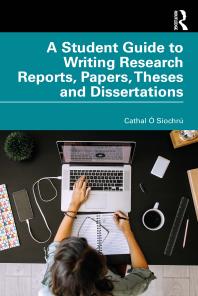If you are looking for a document in the Dissertation Center or Applied Doctoral Center and can't find it please contact your Chair or The Center for Teaching and Learning at ctl@ncu.edu
Dissertation topics are a special subset of research topics. All of the previously mentioned techniques can, and should, be utilized to locate potential dissertation topics, but there are also some special considerations to keep in mind when choosing a dissertation topic.
Dissertation topics should interesting, feasible, relevant, and worthy. The criterion of feasibility is especially important when choosing a dissertation topic. You don’t want to settle on a topic and then find out that the study you were imagining can’t be done, or the survey or assessment instrument you need can’t be used. You also want to make sure that you select a topic that will allow you to be an objective researcher. If you select a topic that you have worked closely on for many years, make sure you are still open to new information, even if that information runs counter what you believe to be true about the topic. To learn more about feasibility, see the Center for Teaching & Learning's Feasibility Checklist.
It is very important to think about these considerations beforehand so that you don’t get stuck during the dissertation process. Here are some considerations to keep in mind when choosing a dissertation topic:
Note that published surveys and assessment instruments are generally NOT free. Due to copyright laws you will more than likely need to purchase the survey from the publisher in order to gain permissions to use in your own study. Unpublished surveys and assessments (usually found in the appendices of articles) may be freely available, but you will need to contact the author(s) to gain permission to use the survey in your research.
Looking at previously published dissertations is a great way to gauge the level of research and involvement that is generally expected at the dissertation level. Previously published dissertations can also be good sources of inspiration for your own dissertation study. Similar to scholarly articles, many dissertations will suggest areas of future research. Paying attention to those suggestions can provide valuable ideas and clues for your own dissertation topic. Note that dissertations are not considered to be peer-reviewed documents, so carefully review and evaluate the information presented in them.
The literature review section in a dissertation contains a wealth of information. Not only can the literature review provide topic ideas by showing some of the major research that has been done on a topic, but it can also help you evaluate any topics that you are tentatively considering. From your examination of literature reviews can you determine if your research idea has already been completed? Has the theory that validates your study been disproved by new dissertation research? Is your research idea still relevant to the current state of the discipline? Literature reviews can help you answer these questions by providing a compact and summative description of a particular research area.
You may find it difficult to find scholarly articles, and books in which your hypothesis is directly addressed. If so, then expand your search to theories and variables that are related, but not directly so. No matter how specific or elusive your topic is, there is research out there that is relevant, so keep looking. Look for resources that address one or two of the variables in your study, theories that are either directly or indirectly related, as well as research that relates specifically to the population of interest. By focusing on resources that address different parts of your research topic, you can combine this information in a way that is directly applicable.
The sub-pages in this section provide resources for your Dissertation Research.
 A Student Guide to Writing Research Reports, Papers, Theses and Dissertations
by
Cathal Ó Siochrú
A Student Guide to Writing Research Reports, Papers, Theses and Dissertations
by
Cathal Ó Siochrú
© Copyright 2025 National University. All Rights Reserved.